The importance of having a will in Thailand was the subject of the Pattaya City Expats Club’s guest speakers, Mark Steele and Rob Hulley from Acorn Partners Asia, and Ed Birkbeck from Atlas Insurance, on June 12.
Mark started with the sad story about an Australian friend who passed away in Thailand without having a will, and the police impounded his car and motorbike before the Australian Embassy or anyone else even knew he was dead.
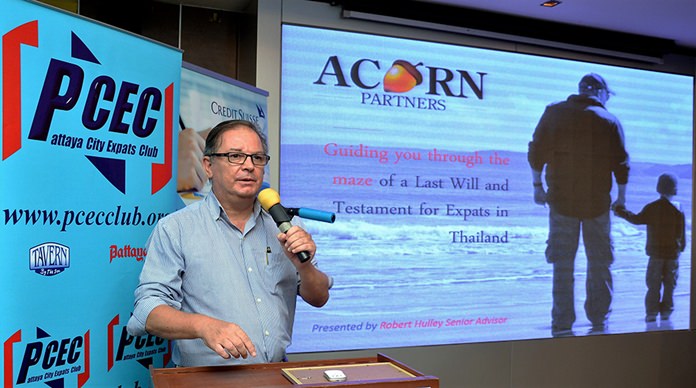
Rob related another instance in which a friend of his from the USA had a family there, but had been divorced 25 years ago, and had remarried with a Thai woman. When he died without a will, the Thai wife got the house here in Thailand, but received none of his significant assets outside of Thailand. To avoid situations like this, Rob said it is highly recommended to have a last will and testament naming all your assets, such as property, bank accounts, vehicle, and personal items as well as naming your heirs.
Rob explained that if there is no will, the statutory heirs have the burden of proof that they are next of kin. Further, they will in practice have to hire a Thai lawyer to represent them during the court probate proceedings in Thailand and perhaps even have to travel to Thailand.
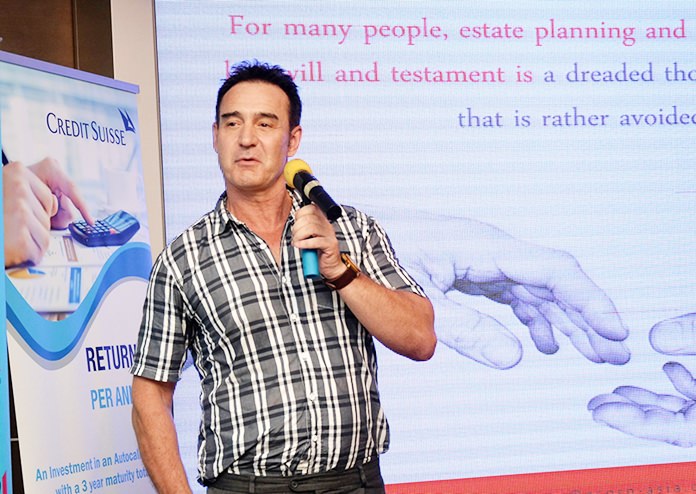
Rob said that under Thai law, if there is no will and no living statutory heirs, the estate devolves to the state. Statutory heirs, if no will, are entitled to inherit according to the following order: Descendants, parents, brothers and sisters of full blood, brothers and sisters of half-blood, grandfathers and grandmothers, and uncles and aunts. The surviving spouse is also a statutory heir. His/her share of the inheritance depends on how many and which type of statutory heirs there are altogether. According to Rob, Thai inheritance law does not recognize the idea of a right to a statutory share. Any heir can be fully disinherited in a written will.
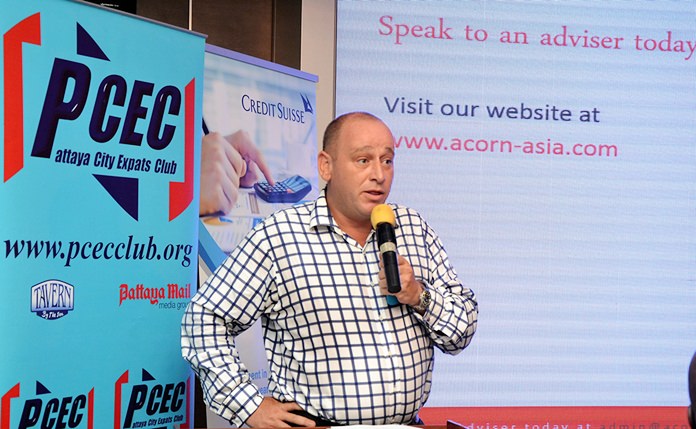
Rob said that in order to obtain probate in Thailand, probate proceedings at the Thai courts will need to be initiated by the heirs. A probate will in most cases be required to administer the estate in an orderly manner, even if the deceased has provided for a last will. If the deceased himself named an administrator in his will, the probate court will appoint this person. One of the heirs, but also a third party, such as Acorn Partners, may act as administrator. Otherwise the court will seek to appoint one of the heirs as administrator of the estate. The administrator will be appointed by the court if none of the heirs’ object.
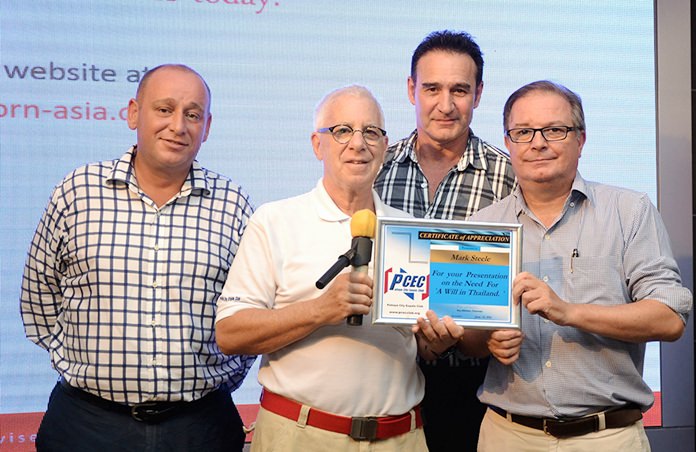
The administrator is obligated to appear personally at the court hearings in Thailand. All proceedings are in Thai. If heirs consent to the appointment of the administrator in writing, they will usually not be required to appear during the hearing of the probate court in Thailand. This means that in a normal probate procedure without complications, the heirs can avoid traveling to Thailand by using a professional administrator such as a lawyer.
According to Rob, if the deceased had a Thai spouse or partner who owns common assets in his/her own name, in particular if they have been paid for by the deceased, the spouse or partner also should have a will. Rob strongly recommends preparing a separate Thai will for assets in Thailand in addition to a will for your home country. Furthermore, having a will drafted in the home country to cover assets in Thailand may be problematic and burdensome to the family as documentation may need to be translated, notarized and approved by a government body. Likewise, a Thai spouse may be required to travel to your home country and meet with family members and lawyers… in this case there may be issues with language difficulties, travel documents as well as cultural challenges.
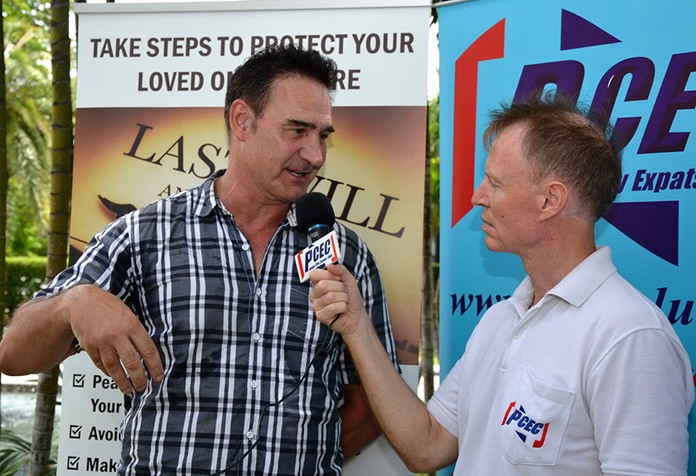
Rob said that your will should list all assets including property, bank accounts, investments, vehicle registrations, other assets and heirlooms. You need to decide on who should be the Executor of your will, and should state in your will a succession scenario. He also suggested that you can control your assets from the grave by putting your assets into a Trust.
Ed Birkbeck suggested buying life insurance as one way to avoid your beneficiaries having to pay death taxes after you pass away. He said life insurance is especially important if you have children. “A lump of money on your passing won’t ease the pain, but it will make things easier, he said.
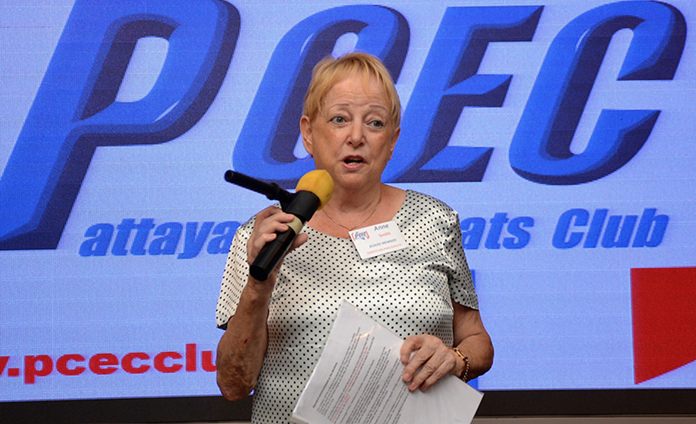
After the presentation, there were several questions and comments from the audience. One of note was whether creating a trust was possible under Thai law. Rob mentioned that a trust can be created in a different country. Another issue dealt with whether a Thai will would supersede a will previously prepared in your own country; a member commented that it was his understanding that if you excluded the usual clause revoking all previous wills it would then have no impact on the validity of the previous will made in your own country. Mark Steele agreed to check with their lawyers to clarify the issue and subsequently advised that the member’s understanding was correct.
For more information on Acorn Partners Asia, visit their websites at: http://www.acorn-asia.com/ and on Atlas Insurance, visit their website at http://atlas-life.com/.
After the presentation, MC Richard Silverberg brought everyone up to date on club activities and happenings around Pattaya before calling on Tony Heron to conduct the Open Forum, where questions are asked and answered about Expat living in Thailand, especially Pattaya.
For more information on the PCEC’s many activities, visit their website at www.pcecclub.org.




